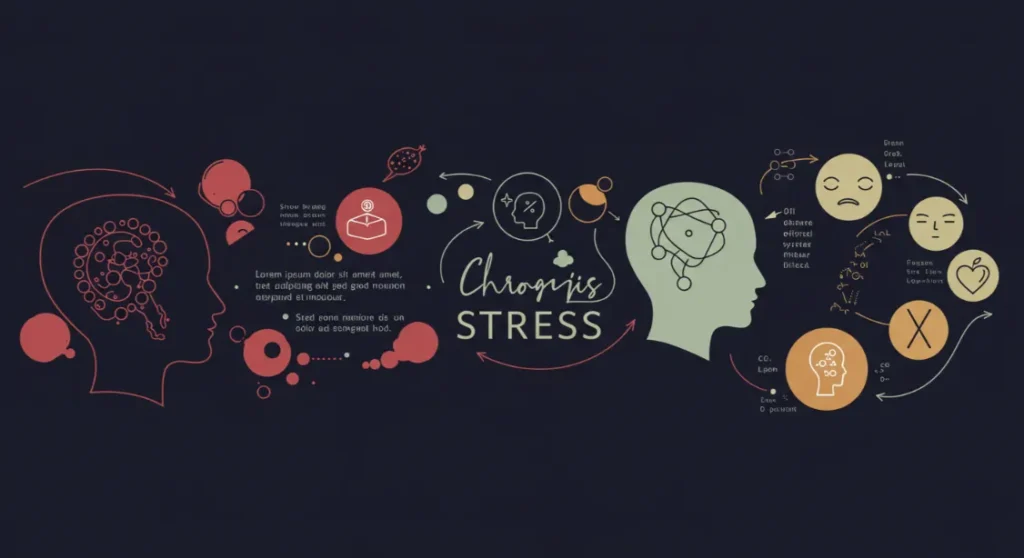Let’s be honest. The modern business world often feels like a pressure cooker. Constant demands, looming deadlines, overflowing inboxes – it’s relentless. This isn’t just inconvenient; chronic stress is a silent saboteur, draining your energy, fogging your judgment, crushing your creativity, and even damaging your physical health. It actively works against your success.
Feeling overwhelmed isn’t a sign of weakness; it’s a signal. It’s your body’s Stress Response – the ancient “fight-or-flight” mechanism kicking in. While helpful for escaping predators, constantly bathing your system in stress hormones like Cortisol in an office setting leads to burnout, anxiety, and decreased performance.
But here’s the game-changer: stress management isn’t just about coping; it’s about building resilience and developing strategic control over your response. It’s about learning to navigate pressure effectively so you can not only survive but thrive.

This isn’t just another list of tips. This is your strategic toolkit. We’ll dive deep into 20 actionable techniques, grounded in understanding how stress affects you, so you can build a personalized system to stay calm, focused, and consistently perform at your peak.
(Think Critically: Before we dive in, take 60 seconds. On a scale of 1-10, how is stress currently impacting your work? What’s one specific situation this week where stress got the better of you?)

Understanding the Battlefield: Stress & Your Performance

When stress hits, your body prepares for immediate danger. Blood diverts from your prefrontal cortex (your rational thinking center) to your limbs. Your heart rate increases, muscles tense, and non-essential functions slow down. This is why, under pressure, complex decision-making, creative problem-solving, and effective communication often go out the window.
Understanding the science of stress helps you recognize these physiological shifts early, allowing you to intervene before performance plummets. Chronic activation of this system can lead to serious issues, from cardiovascular problems to weakened immunity and mental health challenges like anxiety and potential Adrenal Fatigue.

Your 20-Point Strategic Stress Defense System
Let’s break down these techniques into actionable categories:
Category 1: Foundational Mind Shifts & Awareness
These techniques change how you perceive and react to stressors.
Become a Stress Detective (Identify Triggers): You can’t fight an invisible enemy. What specifically triggers your stress? Is it last-minute requests? A particular colleague? Financial uncertainty? Imposter syndrome?
Try This: Keep a “Stress Log” for one week. Note the time, situation, your physical/emotional reaction, and your thoughts. Recognizing patterns is the crucial first step to targeted management. This self-awareness is key to essential life management skills.
Master the Moment (Practice Mindfulness Daily): Mindfulness pulls you out of anxious future-tripping or past regrets and anchors you in the present. This actively calms the nervous system.
Try This:
Box Breathing: Inhale for 4 seconds, hold for 4, exhale for 4, hold for 4. Repeat 5 times when feeling overwhelmed.
5-Minute Mindful Check-in: Set a timer. Close your eyes. Notice your breath. Scan your body for tension. Acknowledge thoughts without judgment. Even short bursts of mindfulness for productivity make a difference.
Rewrite Your Inner Script (Positive Self-Talk): Your internal dialogue significantly impacts your stress levels. Negative self-talk fuels the fire.
Try This: Catch negative thoughts (“I can’t handle this,” “I’m going to fail”). Challenge them and reframe: “This is challenging, but I can break it down,” “I’ve handled tough situations before, I can learn from this.” Consistent use of positive affirmations can gradually rewire stress pathways, similar to principles in Cognitive Behavioral Therapy.
Embrace the Climb (Cultivate a Growth Mindset): Perceiving challenges as threats triggers stress. Seeing them as opportunities for learning changes everything.
Try This: When faced with a setback, ask: “What can I learn here?” instead of “Why did this happen to me?” Focus on effort and progress, not just outcomes. Shifting from a fixed mindset to a growth mindset builds resilience.
Focus on the Good (Practice Gratitude): Gratitude literally shifts your brain’s focus away from stressors and towards positive experiences, reducing Cortisol.
Try This: End your workday by writing down 3 specific things you’re grateful for (even small ones). Express genuine appreciation to a colleague. The power of gratitude is a simple but profound stress antidote.
Connect to Your Why (Find Purpose): Stress feels heavier when work feels meaningless. Connecting your tasks to larger goals or personal values provides powerful context and motivation.
Try This: Reflect: How does your work contribute? What aspects genuinely satisfy you? Aligning actions with purpose makes navigating stressful periods more manageable and helps you find your passion.
Know What to Hold Onto (Learn to Let Go): Wasting energy on things outside your control is a major stress amplifier.
Try This: Practice distinguishing: “Is this something I can influence or change?” If not, consciously practice acceptance. Release perfectionism; often “good enough” is truly sufficient.
Category 2: Actionable Habits & Routines
These are concrete actions you integrate into your daily and weekly flow.
Command Your Calendar (Master Time Management): Feeling out of control fuels stress. Taking charge of your schedule creates predictability and reduces overwhelm.
Try This:
Eisenhower Matrix: Categorize tasks (Urgent/Important). Focus on Quadrant 2 (Important, Not Urgent).
Time Blocking: Schedule specific blocks for focused work, meetings, and breaks.
Effective strategies help you prioritize tasks and feel less scattered.
Build Your Fortress (Create Clear Boundaries): The “always-on” culture is a recipe for burnout. Boundaries protect your energy and mental space.
Try This: Define work hours and stick to them. Turn off notifications outside these hours. Designate a work-only space if possible. Learn to politely decline requests when you’re at capacity. Setting boundaries is crucial to beat burnout.
Recharge Strategically (Take Meaningful Breaks): Non-stop work decreases productivity and skyrockets stress. Breaks are essential investments.
Try This: Use the Pomodoro Technique (25 min work, 5 min break). Step away from your screen during breaks. Take a real lunch break. Use your vacation time!
Integrate Calm (Implement Stress-Reduction Habits): Small, consistent habits build resilience over time.
Try This: Start your day with 5 minutes of quiet reflection instead of checking email immediately. Create an “end-of-day” ritual (e.g., tidying your desk, planning tomorrow’s top 3 tasks) to signal the shift to personal time. A strong morning routine for success sets a proactive tone.
Develop Healthy Outlets (Cultivate Coping Skills): Find healthy ways to process stress, rather than resorting to detrimental ones (e.g., excessive drinking, overeating, avoidance).
Try This: Experiment! Does exercise blow off steam? Does a creative hobby provide distance? Does spending time in nature calm you? Does journaling for self-improvement help you process emotions? Find your healthy outlets.
Category 3: Optimizing Your Environment
Your physical and digital surroundings significantly impact your stress levels.
Curate Your Workspace (Optimize Physical Environment): A chaotic or uncomfortable workspace creates low-grade chronic stress.
Try This: Declutter your desk (physical and digital). Ensure proper ergonomics (chair height, monitor position). Add a plant. Control noise with headphones if needed. A calm space promotes a calm mind.
Leverage Your Tools (Use Technology Wisely): Tech can be a stressor or a solution. Be intentional.
Try This: Use meditation apps (Headspace, Calm). Employ task management tools (Asana, Trello). Utilize “do not disturb” modes during focus blocks. Automate repetitive tasks. The right tools help you stay focused online.
Cut the Complexity (Simplify Where Possible): Unnecessary complexity drains mental energy and increases stress.
Try This: Streamline workflows. Create templates or standard procedures for common tasks. Delegate effectively. Apply the 80/20 rule to focus on high-impact activities.
Category 4: Building Resilience & Support
These strategies focus on strengthening your internal and external resources.
Fortify Your Foundation (Build Physical Resilience): Your body’s ability to handle stress is directly linked to your physical health.
Try This:
Move Your Body: Aim for 30 mins of moderate exercise most days (releases endorphins).
Fuel Wisely: Prioritize whole foods; limit caffeine/sugar spikes and crashes.
Prioritize Sleep: Aim for 7-9 hours. Poor sleep dramatically lowers your stress threshold. Understand the crucial link between sleep and mental health.
Hydrate: Dehydration can mimic and worsen stress symptoms.
Lean on Your Tribe (Develop a Support Network): You don’t have to navigate stress alone. Connection is a powerful buffer.
Try This: Connect with trusted colleagues. Find a mentor. Join professional groups. Talk to friends and family. Consider a coach or therapist for dedicated support.
Talk it Out (Improve Communication Skills): Misunderstandings, unmet expectations, and unresolved conflicts are major workplace stressors.
Try This: Practice clear, direct communication. Address conflicts constructively and early. Use active listening. Ask for clarification and provide context.
Set Realistic Sails (Manage Expectations): Constantly falling short of unrealistic expectations (yours or others’) fuels stress and kills motivation.
Try This: Set achievable goals. Communicate your capacity honestly. Renegotiate deadlines proactively if needed. Practice self-compassion when things go imperfectly.
Know When to Call for Backup (Seek Professional Help): Sometimes, self-management isn’t enough, especially with chronic or overwhelming stress.
Try This: Recognize the signs that you need more support (persistent anxiety, sleep disruption, withdrawal, physical symptoms). Don’t hesitate to consult a therapist, counselor, coach, or your doctor. Seeking help is a proactive step towards effectively managing chronic stress.
(Critical Thinking Checkpoint: Review the 20 techniques. Which 3 feel most relevant or potentially impactful for your specific stress triggers identified earlier? Why those?)
Beyond the List: Building Your Personalized Stress Resilience Plan
True stress mastery isn’t about randomly applying tips; it’s about building a system that works for you.
Assess & Identify: Use your Stress Log insights. What are your top 1-3 recurring stressors?
Select Your Starter Kit: Choose 3-5 techniques from the list above that directly address your triggers or seem most appealing/feasible right now.
Commit & Experiment: Implement these techniques consistently for 21-30 days. Treat it like an experiment.
Track & Evaluate: Notice the impact. What’s working? What’s not? Journaling helps here.
Adjust & Expand: Refine your approach. Swap out techniques that aren’t effective. Gradually add 1-2 more strategies as you build momentum.
Iterate: Stress management is an ongoing practice, not a destination. Revisit your plan quarterly or when circumstances change.
The Takeaway: From Surviving Pressure to Thriving In It
Stress is an inevitable part of ambition and growth. But suffering under its weight is optional. By understanding the Stress Response, proactively implementing targeted strategies, and cultivating Resilience, you shift from being reactive to being strategically in control.
The most powerful approach blends preventative measures (like exercise, sleep, boundaries) with in-the-moment tools (like mindful breathing, self-talk). This equips you to handle whatever the high-pressure business environment throws your way.
Managing stress effectively isn’t about eliminating it; it’s about optimizing it. It’s about transforming potential overwhelm into focused energy, enabling you to think clearly, lead effectively, and achieve sustainable success without sacrificing your well-being.
Start today. Choose one technique. Take one small step. Your future, less-stressed self will thank you.
References:
- https://ppl-ai-file-upload.s3.amazonaws.com/web/direct-files/1044541/9f69e9ce-dcd0-4259-a7b3-b61eeea95d15/paste.txt
- https://gearuptogrow.com/mental-wellness/manage-work-stress/
- https://gearuptogrow.com/learning-dev
- https://www.webmd.com/balance/stress-management/stress-management
- https://www.scribe4me.com/virtual-staffing-services.php
- https://www.mikeginley.com/blog/internal-linking-best-practices-for-seo/
- https://www.webmd.com/balance/tips-to-control-stress
- https://www.healthline.com/health/10-ways-to-relieve-stress
- https://www.webmd.com/balance/stress-management/stress-and-how-it-affects-your-mental-health
- https://support.google.com/webmasters/thread/106383980/internal-links?hl=en
- https://www.health.harvard.edu/staying-healthy/top-ways-to-reduce-daily-stress
- https://forum.bubble.io/t/internal-links-not-crawled-for-google-seo-on-bubble/279191
- https://www.healthline.com/health/work-stress
- https://www.youtube.com/watch?v=zUTFxDZxNK8
- https://www.mayoclinic.org/healthy-lifestyle/stress-management/in-depth/stress/art-20046037
- https://forum.ghost.org/t/how-do-i-create-internal-links-using-anchors/20853
- https://www.health.harvard.edu/mind-and-mood/best-ways-to-manage-stress
- https://www.youtube.com/watch?v=_TDgBNTkAJY
- https://www.mayoclinic.org/healthy-lifestyle/stress-management/in-depth/exercise-and-stress/art-20044469
- https://www.apa.org/topics/stress/tips
- https://original.lolcow.farm/ot/res/46070.html
- https://www.youtube.com/watch?v=q6DyF04neP4